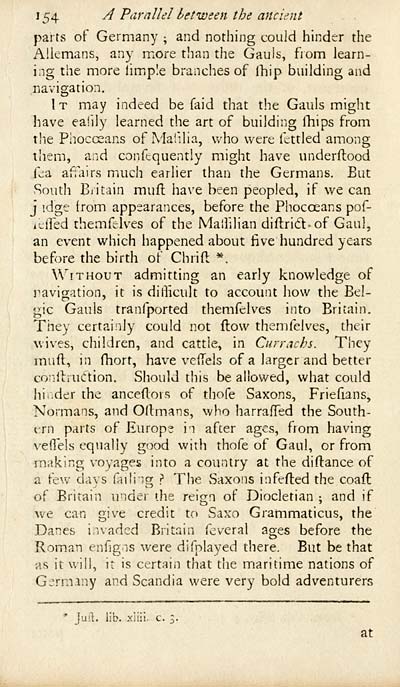Blair Collection > Critical dissertations on the origin, antiquities, language, government, manners, and religion, of the antient Caledonians, their posterity the Picts, and the British and Irish Scots
(192)
Download files
Complete book:
Individual page:
Thumbnail gallery: Grid view | List view

1 54 ^ Parallel between the ancient
parts of Germany ; and nothing could hinder the
AUemans, any more than the Gauls, fiom learn-
ing the more limple branches of fhip building and
navigation.
It may indeed be faid that the Gauls might
have eafily learned the art of building Ihips from
the Phocoeans of i\'Ialilia, who were fettled among
them, and confcquently might have underftood
f^a afiliirs much earlier than the Germans. But
South Biitain muft have been peopled, if we can
j idge from appearances, before the Phocoeans pof-
iclfed themfelves of the Mallilian diftrid-of Gaul,
an event which happened about five hundred years
before the birth of Chrifl *.
Without admitting an early knowledge of
ravigation, it is difficult to account how the Bel-
gic Gauls tranfported themfelves into Britain,
They certaiiily could not flow themfelves, their
wives, children, and cattle, in Currachs. They
mud, in fhort, have veilels of a larger and better
coiilhuCtion. Should this be allowed, what could
hir;der the anceflors of thofe Saxons, Friefians,
Normans, and Ollmans, who harraffed the South-
t:rn parts of Europe ii after ages, from having
veiTels equally good with thofe of Gaul, or from
making voyages into a country at the diflance of
a few days failiig ? The Saxons infefted the coafl
of Britain under the reign of Diocletian ; and if
we can give credit to Saxo Grammaticus, the
Danes invaded Britain feveral ages before the
Roman enfigns were difplayed there. But be that
as it will, it is certain that the maritime nations of
Germany and Scandia were very bold adventurers
' juil. lib. xiiii. c. 3.
at
parts of Germany ; and nothing could hinder the
AUemans, any more than the Gauls, fiom learn-
ing the more limple branches of fhip building and
navigation.
It may indeed be faid that the Gauls might
have eafily learned the art of building Ihips from
the Phocoeans of i\'Ialilia, who were fettled among
them, and confcquently might have underftood
f^a afiliirs much earlier than the Germans. But
South Biitain muft have been peopled, if we can
j idge from appearances, before the Phocoeans pof-
iclfed themfelves of the Mallilian diftrid-of Gaul,
an event which happened about five hundred years
before the birth of Chrifl *.
Without admitting an early knowledge of
ravigation, it is difficult to account how the Bel-
gic Gauls tranfported themfelves into Britain,
They certaiiily could not flow themfelves, their
wives, children, and cattle, in Currachs. They
mud, in fhort, have veilels of a larger and better
coiilhuCtion. Should this be allowed, what could
hir;der the anceflors of thofe Saxons, Friefians,
Normans, and Ollmans, who harraffed the South-
t:rn parts of Europe ii after ages, from having
veiTels equally good with thofe of Gaul, or from
making voyages into a country at the diflance of
a few days failiig ? The Saxons infefted the coafl
of Britain under the reign of Diocletian ; and if
we can give credit to Saxo Grammaticus, the
Danes invaded Britain feveral ages before the
Roman enfigns were difplayed there. But be that
as it will, it is certain that the maritime nations of
Germany and Scandia were very bold adventurers
' juil. lib. xiiii. c. 3.
at
Set display mode to: Large image | Transcription
Images and transcriptions on this page, including medium image downloads, may be used under the Creative Commons Attribution 4.0 International Licence unless otherwise stated. ![]()
| Permanent URL | https://digital.nls.uk/76288723 |
|---|
| Description | A selection of books from a collection of more than 500 titles, mostly on religious and literary topics. Also includes some material dealing with other Celtic languages and societies. Collection created towards the end of the 19th century by Lady Evelyn Stewart Murray. |
|---|
| Description | Selected items from five 'Special and Named Printed Collections'. Includes books in Gaelic and other Celtic languages, works about the Gaels, their languages, literature, culture and history. |
|---|

